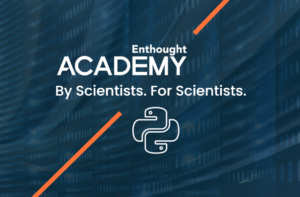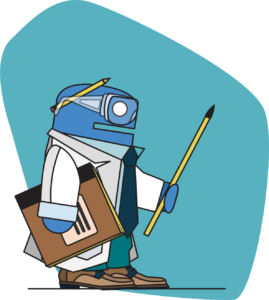Transformation
Scattered and siloed data is one of the top challenges slowing down scientific discovery and innovation today. What every R&D organization needs is a data fabric as part of their technology solution set.
Read MoreBy Mike Heiber, Ph.D., Materials Informatics Manager Enthought, Materials Science Solutions The American Chemical Society (ACS) is a premier scientific organization with members all over the world from both academia and industry. Some of my team and I recently returned from their primary annual convening, the ACS 2023 Fall Meeting, held in San Francisco. I…
Read MoreThere’s a long history of scientists who built new tools to enable their discoveries. Tycho Brahe built a quadrant that allowed him to observe the path and distance of a comet as it crossed the solar system, helping to prove the heliocentric model of the way the stars and planets move. Galileo Galilei built his…
Read MoreWith the increasing importance of AI and machine learning in science and engineering, it is critical that the leadership of R&D and IT groups at innovative companies are aligned. Inappropriate budgeting, policies, or vendor choices can unnecessarily block critical research programs; conversely an “anything goes” approach can squander valuable resources or leave an organization open to novel security threats.
Read MoreGenerative models can be used in many more areas than just language generation, with one particularly promising area: molecule generation for chemical product development.
Read MoreScientists gain superpowers when they learn to program. Programming makes answering whole classes of questions easy and new classes of questions become possible to answer. If you have some programming experience, large language models (LLMs) can raise the ceiling of your performance and productivity. Using LLMs to write code turns a challenging recall task (What’s…
Read MoreOpenAI’s ChatGPT, Google’s Bard, and other similar Large Language Models (LLMs) have made dramatic strides in their ability to interact with people using natural language. Users can describe what they want done and have the LLM “understand” and respond appropriately.
Read MoreYou know it. We know it. NumPy is cool. Pandas is cool. We can bend them to our will, but sometimes they’re not the right tools for the job. Enter Xarray and Awkward Array. Read on for the four reasons why you need to learn these Python packages. Reason 1: You need labeled arrays of…
Read MoreFor many traditional innovation-driven organizations, scientific data is generated to answer specific immediate research questions and then archived to protect IP, with little attention paid to the future value of reusing the data to answer other similar or tangential questions.
Read MoreLike most people, I mostly interact with Python using the default REPL or with IPython. Yet, I often reach for one of the Python tools that come with the standard library. All these tools are implemented as “mains” in the various scripts and modules. Here are 7 I use on a semi-regular basis. 1. &…
Read More







